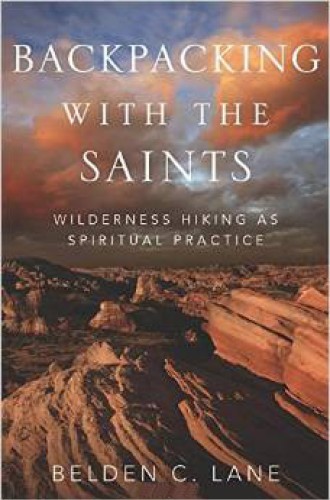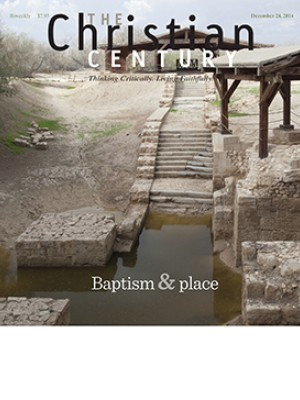Words and wilderness
My backpacking trips have been alternately miserable and glorious, harsh and enlightening. Occasionally I’ve gotten in over my head (once I wound up with hypothermia while wearing cotton in a thunderstorm), and at other times the aftermath of a hike in the backcountry has been downright painful (like when I lost toenails after a 33-mile trip in too-new, too-small boots).
Regardless of the challenges, such times away without frills or distractions are touchstones for remembering who I am. I carry everything I need on my back. No laptop, no phone, and especially no books. Even paperbacks are too heavy in an already overloaded pack when something as light as my toothbrush must be scrutinized for weight.
Read our latest issue or browse back issues.
But after reading Belden Lane’s Backpacking with the Saints: Wilderness Hiking as Spiritual Practice, I’m tempted to begin toting a tome or two. For Lane, backpacking is more than just a hike in the great outdoors. It’s a chance to explore words that invite us more deeply into the spiritual life. What Lane seeks in the wilderness, he says, is not exercise or escape. Rather, he is looking for the physical and spiritual depth of intimacy that the combination of words and wilderness provides.
“I’m moved by nature’s power and beauty, but what sets me afire is the longing I sense there of everything else wanting to connect, the desire for an intimacy that is as alluring as it is frightening,” writes Lane. In search of connections between sensuous spirituality and earthy experiences, he reads spiritual texts while camping under the stars.
Lane, who describes himself as “an absentminded professor with ADD, inattentive to little things,” is professor of theological studies at Saint Louis University. From time to time he heads for the Missouri Ozarks and straps on his backpack. It’s an antidote for Lane to any sense of self-importance. “Exposure to the harsh realities and fierce beauties of a world not aimed at my comfort has a way of cutting through the self-absorption of my life,” he explains. Backpacking puts the ego in check, grounds our souls, enforces discipline. “It reminds me, in short, that spiritual practice—far from being anything ethereal—is a highly tactile, embodied, and visceral affair.”
Lane argues that displacement—reading the saints and encountering familiar and unfamiliar texts in out-of-the-way places—often prompts new insights. As he did in a previous book, The Solace of Fierce Landscapes, he peoples his spiritual geography with rich diversity. He looks to many traditions—Celtic, Buddhist, Catholic, Protestant, Sufi, and Hindu—to illustrate his points. Jean Pierre de Caussade reminds Lane to be attentive; John Bunyan reinforces the importance of simplicity. Søren Kierkegaard’s words are permeated with knowledge of the solitary life; Dag Hammarskjöld knows how to travel lightly; and Thich Nhat Hanh’s writings encourage him as he strives for mindfulness.
Nature lovers will find familiar writers such as Annie Dillard, Terry Tempest Williams, and Gary Snyder sprinkled throughout the chapters like raisins in trail mix. There are plenty of tantalizing excerpts and snippets from various books to send you straight to the nearest library or bookstore.
Risk taking is part of the package of hiking the backcountry. Risk, Lane tells us, is also intrinsic to the life of the spirit. We may find ourselves cowering under cover as a grizzly methodically tears apart a backpack, as writer Paul Gruchow did in the Bob Marshall Wilderness. Or you might end up like I did, shivering and disoriented after a seven-mile hike across a slippery rock face in a driving, cold rain or listening to 50 mile per hour winds topple trees near your tent on a wilderness island. Our best-laid plans often go astray on wilderness outings; likewise, our plans for our spiritual lives sometimes come to grief. After forgetting his tent fly and spending a night in the rain, Lane reflected on the correlation between “stupidity and wisdom on the learning curve of backcountry experience.” There are no guarantees that backpacking will lead to spiritual growth. “Far from building character, the wilds sometimes simply terrify,” Lane writes. But, as he adds later in the book, “mindfulness is a rigorous practice of welcoming the moment, whatever it brings.”
A life of theological reflection is also not entirely safe if we internalize what we read and learn. When we read the words of the saints, listen, and let go of our preconceptions, we risk personal transformation. Lane says that the desert Christians warn us that we will be wounded in our wilderness journeys. “But in the process, you may discover your greatest joy in having survived the night, in finding resources you never knew you had, falling back on a strength that was more than yours.”
OK, I ask myself again, why do I want to take a book with me into the wild? Wilderness reading, Lane argues, is different from reading in a room with walls. You pause more often to attend to the call of a bird or the wind moving through the trees. Place influences how you imbibe text. “The book of nature communicates a danger and beauty that stirs the senses, opening the soul to a corresponding truth found in the text of scripture.”
He makes a compelling case. After listening to Lane, I’m already making room in my pack for one of the books he recommends. Lane tells me that the mystic Pierre Teilhard de Chardin’s The Divine Milieu is small enough to fit into a pocket. Still, I will have to leave something else at home to make room for it. Who needs a toothbrush when you can have enlightenment?







